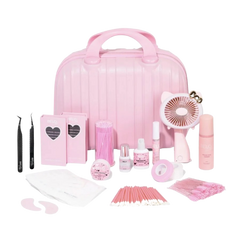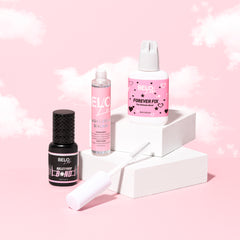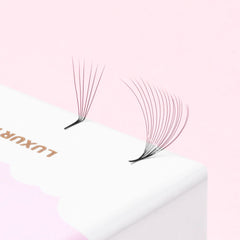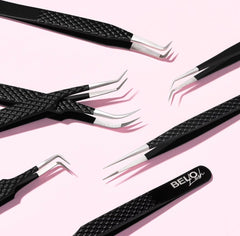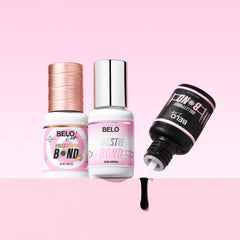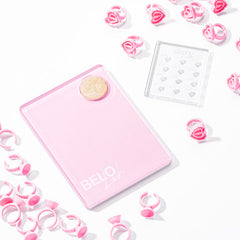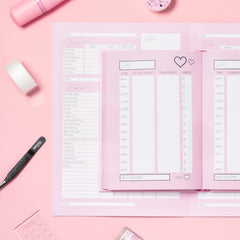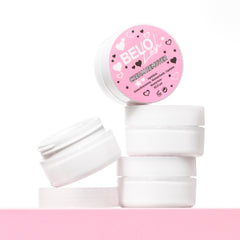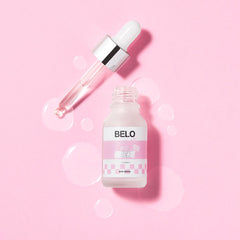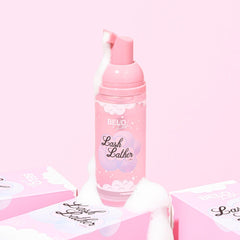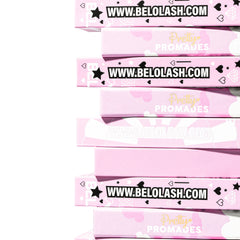Every lash tech wants their clients to leave their salon with a renewed sense of beauty. We strive to create stunning, jaw-dropping looks that will turn heads at every corner. Not only this, we also want our clients to have a safe and comfortable experience.
Sure, we all want to receive a message from our clients letting us know how much they love their new lashes. The absolute last thing any lash tech wants to hear from a client is that they're experiencing an allergic reaction.
Allergic reactions can throw a curveball in our lash game, and whether you're a new or more experienced lash tech it can sound quite scary to hear that your client has returned home with sore or itchy eyes.
It is the unfortunate reality that allergic reactions can occur when dealing with lash adhesives. However, by being proactive and informed about the potential allergens present in lash glues and implementing effective patch testing, lash artists can take steps to minimise the risk and ensure a safer lash extension experience.
We'll guide you through the ins and outs of managing eyelash extension glue allergies like seasoned pros, from understanding the causes and symptoms to preventive measures and alternative solutions.
What is a lash adhesive allergy?
Allergic reactions can occur from all types of different things. The human body is sensitive, so it's important to always be on the lookout for how your clients react to different products.
When it comes to lash extensions, the majority of allergies occur from eyelash extension glue. Whilst rare, these reactions are due to the ingredients that are used in it.
An allergy occurs when the human body reacts to something as it sees it as a threat or dangerous. When this occurs, the body produces antibodies to fight these allergens.
This is what produces the symptoms found in many occur reactions, from red or bloodshot eyes to itchiness as it is the body trying to defend itself against the allergen.
What are the ingredients in lash glue that cause an allergic reaction?
There are a variety of ingredients in lash adhesives that contribute to their adhesive properties.While these ingredients are generally safe for most individuals, some people may develop allergic reactions to specific components.
It's important to be aware of the potential allergens present in lash glues. Here are some common ingredients that can cause an allergic reaction:
Cyanoacrylate
Cyanoacrylate is a key ingredient found in most eyelash extension glues. It's a fast-acting adhesive that creates a strong bond between the natural lashes and the extensions. However, some people may develop an allergic reaction to cyanoacrylate.
Latex
While less common, some eyelash extension glues may contain latex. Latex allergies are relatively prevalent, and individuals who are allergic to latex may experience adverse reactions when exposed to latex-containing lash glue.
What are the symptoms of a lash extension allergy?
As a lash tech, it's just as much a part of your job to be able to spot an allergic reaction as it is to know how to apply the lash extensions.
Whether these symptoms show up during the procedure or once the client has returned home, you need to be able to identify what symptoms are the result of an allergic reaction.
Allergic reactions to lash glue can show a variety of different symptoms. Typical symptoms often include:
- Redness and Irritation: The affected area may become red, swollen, and itchy.
- Burning or Stinging Sensation: Some individuals may experience a burning or stinging sensation around the eyes.
- Watery Eyes: Excessive tearing or watery eyes can be a symptom of an allergic reaction.
- Puffiness: Swelling around the eyes is a possible indicator of an allergy.
- Discomfort: Clients may experience discomfort or pain in the lash area.
How do you treat an eyelash glue allergy?
When you do receive that message from your client pointing out a few strange symptoms they may be experiencing, don't panic! There is advice you can offer to your clients to help calm down their allergic reactions and provide more comfort.
Cold compress
Applying a cold compress can be very effective for those who are experiencing very mild symptoms, especially soreness, redness or itchiness.
Whilst cold compresses are not a treatment to an allergic reaction, they can help to provide a relief to the discomfort they may be experiencing.
Lash extension removal
In most cases, the most effective solution to alleviating your client's symptoms is to remove the lash extensions.
If you notice that your client is developing an allergic reaction to eyelash extensions during the application process, calmly communicate to them what is happening and that the lash extensions need to be removed.
If your client develops an allergic reaction to eyelash extensions after leaving the salon, offer them a removal free-of-charge at their nearest convenience. It should be an absolute priority, helping to make them also feel safer and building trust for future applications.
Using a gentle remover such as the Cream Lash Extension Remover helps to loosen the bond between the lash glue and the natural eyelashes, allowing them to be removed with ease.
Seek medical advice
Remember, whilst lash artists are able to assist with more mild symptoms when it comes to allergic reactions, the majority of lash techs are not medical professionals.
In the event that your client is experiencing more severe symptoms, advise them to seek medical advice from a professional as soon as possible..
What's the difference between a lash extension allergy and lash irritation?
The main difference between a lash extension allergy and lash irritation lies in their underlying causes and the severity of symptoms. Lash irritation refers to temporary discomfort, redness, and mild itching that can occur due to factors like improper application or sensitivity to certain products.
These symptoms usually subside within a short period with proper care. On the other hand, a lash extension allergy is an allergic reaction to the adhesive or other components used in lash extensions.
It can result in more pronounced symptoms such as persistent redness, intense itching, significant swelling, a burning sensation, and even eyelash loss.
These allergic reactions may require identifying and avoiding specific allergens, along with seeking advice from a lash technician or medical professional for proper evaluation and guidance.
How to avoid allergic reactions to lash extensions
Patch test
Performing a patch test on any new clients can be a great way of catching any allergies that they may have. While patch tests for many products are usually applied to the skin, eyelash adhesive should only be tested on the lashes themselves because it should not be applied directly to the skin.
If no adverse reactions to the adhesive occur, it is generally safe to proceed with the lash extension application.
Client consultation
Another effective way of preventing an allergic reaction to eyelash extension glue is by providing your new clients with client record cards and consultation forms.
As a lash artist, conducting a thorough consultation with your clients is a great way to not only learn more about them, but also helps to avoid any nasty allergic reactions.
Ask about any known allergies or sensitivities they may have. Understanding their medical history can help you choose the right adhesive and take necessary precautions.
Using a lash adhesive that is latex-free is also a great way to help clients with a latex allergy avoid a reaction. In fact, all of our lash adhesives here at BELO Lash are latex-free ensuring a safer experience with more peace of mind for both lash techs and clients.
Proper ventilation
Ensure proper ventilation in your lash studio or treatment area. Good airflow helps disperse any fumes or particles released during the lash extension application, reducing the risk of an allergic reaction.
Conclusion
Lash extension allergies can be a real pain, literally and figuratively! As a lash technician, it is essential to know your stuff about eyelash glue allergies just as much as it's important to know about how to apply the eyelash extensions themselves.
Eyelash extension glue allergy can be an uncomfortable and distressing experience, but with proper knowledge and precautions, it can be effectively managed.
By recognising the symptoms, taking preventive measures, and knowing the available treatment options, lash artists and clients alike can enjoy the beauty and convenience of eyelash extensions without worry.
For more information, contact our team today!

